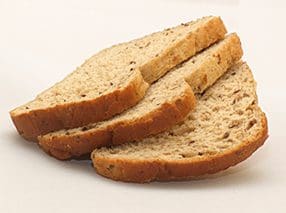We are all hearing the word ‘gluten’ more and more these days – ever wondered why? What’s so important about gluten and how would you know if it’s compromising your health?
If you were to eat hamburgers, deep fried food and chips and then wash it down with lashings of soft drink, you would more than likely realise that you are shortening your life. What if you were to eat a sandwich made from fresh sourdough wholemeal bread? You would probably think that you are making a healthier choice, wouldn’t you?
Here is where it gets a bit tricky!
Bread contains gluten, which is a protein found in wheat, oats, barley, rye, kamut and spelt. Although you can’t see it or taste it, gluten is in pizza, pasta, bread and most processed food.
Gluten provides structural properties to these foods and helps bread to rise. Australians eat lots and lots of these types of foods and don’t realise that the gluten contained in them has the potential to cause serious health problems for some.
Even if you haven’t been diagnosed with coeliacs disease, you may still be at risk . . .
The Dangers of Gluten
A recent study comparing the blood of 10,000 people from fifty years ago to the same number of people today, found that those who suffer with full blown coeliac disease (that is to say elevated TTG antibodies) has increased by a whopping 400 percent!
Imagine if cancer or heart disease had shown such an increase over this period – it would have been front page news at the least and maybe even an International Gluten Free Day would have made its debut, yet we hear hardly anything about it.
Another study (which looked at almost 30,000 people between 1969 – 2008) found that those with gluten sensitivity (diagnosed, undiagnosed or latent coeliac disease) had an increased risk of death from heart disease or cancer. There was a 39% increase in risk of death for those with coeliac disease, a huge 72% increased risk in those with gut inflammation due to gluten and a 35% increased risk in those with no coeliac disease but with gluten sensitivity. Now that has got to get you sitting up and paying attention!
So even if you haven’t been diagnosed with coeliac disease, you can still have serious complications and health problems (yes, you could even die) from eating gluten.
How then is it that an estimated 99% of people who have a problem with eating gluten don’t even realise it?
Most put their ill health or myriad of symptoms down to other issues – never thinking that gluten could be doing them very serious harm indeed. It is good to know however, that gluten sensitivity can be dealt with by simply changing the diet – it is 100% curable!
So many diseases can be caused by eating gluten – as a matter of fact there are more than 55 of them! These include lupus, multiple sclerosis, cancer, anaemia, osteoporosis and almost all other autoimmune diseases. Migraines, epilepsy, dementia, depression and anxiety are also linked to gluten sensitivity.
What is Gluten Sensitivity?
It is an abnormal immune reaction to gluten which creates inflammation throughout the body. It has wide ranging effects across all of the organs in your body and can be the single cause behind numerous ‘diseases’.
It is not just children who get gluten sensitivity or even full blown coeliac disease – you can be older and still have it.
Do I have Gluten Sensitivity?
To find out if you are one of the millions of people who suffer, you can have a blood test, a gene test or you can start off by following this procedure –
- For a period of four weeks, eliminate all gluten from your diet and see how you feel. You must eliminate 100% of the gluten – so that means not even one crumb of bread! You must be vigilant and read the labels on EVERYTHING because there is often gluten hidden in sauces, salad dressings, sauces, stock, soup mixes or even certain brands of vitamins or medications.
- After this period, eat gluten again and see how you feel. If you feel unwell or bad in any way, then you should stay off gluten permanently. Try the above procedure on your children and see if their energy levels rise, their skin tones brighten and their general mood and wellbeing shows any positive improvement.
- Changing your diet to one without gluten in it seems quite difficult at first but with a little practice it is relatively easy – especially when you think of the alternative!
- When attempting to lose weight, the first things that need to be stopped or minimised in our diets are things like pasta, bread, biscuits and cakes – and all of these things have gluten in them.
- Remember, QuickLoss does not contain gluten so you can safely enjoy your meal replacement shakes and then choose protein (lean red meat, chicken, pork, eggs or fish) and a delicious fresh salad for dinner without worrying about hidden gluten.
- Snack on raw seeds and nuts, fruit, cheese or high protein, low carb gluten free snack bars from Cabot Health . . . . too easy!

